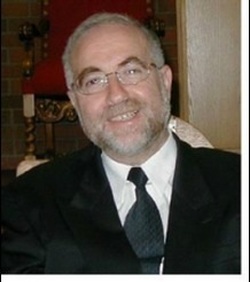
The following is presented by our 2015 scholar-in-residence, Rabbi Simon Benzaquen.
Rabbi Benzaquen is a native of Spanish Morocco and has served as the rabbi of communities around in the world, including Essex England, Maracaibo Venezuela, and most recently Seattle Washington as Rabbi of Bikur Holim and member of the Va'ad HaRabanim of Greater Seattle.
In addition he has been a co-chair of the board of Rabbis for the American Sephardi Federation and Vice President of the Rabbinical Council of America.
For his full biography, please click here.
Rabbi Benzaquen is a native of Spanish Morocco and has served as the rabbi of communities around in the world, including Essex England, Maracaibo Venezuela, and most recently Seattle Washington as Rabbi of Bikur Holim and member of the Va'ad HaRabanim of Greater Seattle.
In addition he has been a co-chair of the board of Rabbis for the American Sephardi Federation and Vice President of the Rabbinical Council of America.
For his full biography, please click here.
In the Mishnah of Tractate Yoma it is spelled out what is the purpose of Yom Kippur, and what does Yom Kippur do for us (8:9). “Averot Sheben Adam La’makom, Yom Kippurim Mechaper”: On Yom Kippur, G-d forgives the sins committed by transgressing against G-d’s commandments. However, “En Yom Kippur Mechaper Averot Sheben Adam La’habero, Ad Sheyeratze Et Habero”: Yom Kippur does not atone for interpersonal errors until a person has placated his friend. That is the reason why it is right and proper to not only go and apologize to our friends for sins committed against them, but to also ask genuinely for their forgiveness before Yom Kippur.
This apology must not become an empty gesture, after which we continue with our original behavior. There is a deadline to consider if, how, and when we apologize to those, especially our most beloved, friends or family, whom we may have really hurt this year.
So what of our apologies, or better yet, our really feeling sorry? How do we consider apologizing? What is a genuine apology that is not considered an empty gesture? Maimonides, (The Rambam, spells out in great detail how we apologize to G-d, and it applies to interpersonal apologies too.
Maimonides writes that a genuine apology is when it emanates from wanting to do Teshuvah, i.e. repent from his transgression, and when he has accomplished these three steps:
We know that out of these three steps, the first is the most difficult to do; to admit in the first place that we were wrong, and take full responsibility for our actions. We have a tendency to automatically rationalize and justify all our wrong doings, even putting the blame on someone else.
Let us hope that we come in to Yom Kippur with a clean slate, and G-d should grant us another Year of good health and prosperity. And above all, peace and harmony in our homes, our community, In Israel, in our United States, and in our world.
Tizku Leshanim Rabbot
Rabbi S. Benzaquen
This apology must not become an empty gesture, after which we continue with our original behavior. There is a deadline to consider if, how, and when we apologize to those, especially our most beloved, friends or family, whom we may have really hurt this year.
So what of our apologies, or better yet, our really feeling sorry? How do we consider apologizing? What is a genuine apology that is not considered an empty gesture? Maimonides, (The Rambam, spells out in great detail how we apologize to G-d, and it applies to interpersonal apologies too.
Maimonides writes that a genuine apology is when it emanates from wanting to do Teshuvah, i.e. repent from his transgression, and when he has accomplished these three steps:
- Hakarat ha’Het, “Admitting that we were wrong” - admission of our personal responsibility.
- Viduy, “To confess” - our sincere confession for the wrong and bad things we've done.
- 'Azibat ha’Het, “To forsake our transgressions” - the resolution to leave our bad habits behind, and to correct our actions.
We know that out of these three steps, the first is the most difficult to do; to admit in the first place that we were wrong, and take full responsibility for our actions. We have a tendency to automatically rationalize and justify all our wrong doings, even putting the blame on someone else.
Let us hope that we come in to Yom Kippur with a clean slate, and G-d should grant us another Year of good health and prosperity. And above all, peace and harmony in our homes, our community, In Israel, in our United States, and in our world.
Tizku Leshanim Rabbot
Rabbi S. Benzaquen

 RSS Feed
RSS Feed
